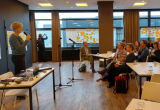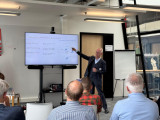The emergence of the Internet of Things (IoT) as the new paradigm of Information and Communication Technology (ICT) and rapid changes in technology and urban needs urge cities around the world towards formulating smart city policies. Nevertheless, policy makers, city planners, and practitioners appear to have quite different expectations from what smart cities can offer them. This has led to the emergence of different types of smart cities and pathways of development. This research aims to answer the research question: When comparing a selection of smart city projects, can we classify pathways for their implementation? We do this by using a cross-case research design of four cities to explore commonalities and differences in development patterns. An input-output (IO) model of smart city development is used to retrieve which design variables are at play and lead to which output. The four cases pertain to the following smart city projects: Smart Dubai, Masdar City, Barcelona Smart City, and Amsterdam Smart City. Our analysis shows that Amsterdam is based on a business-driven approach that puts innovation at its core; for Masdar, technological optimism is the main essence of the pathway; social inclusion is the focus of Barcelona Smart City; and visionary ambitious leadership is the main driver for Smart Dubai. Based on these insights, a classification for smart city development pathways is established. The results of the present study are useful to academic researchers, smart city practitioners, and policy makers.
Want to receive updates like this in your inbox?
Get notified about new updates, opportunities or events that match your interests.
Maybe you will also like these updates
Red Light District Relocation: What do you think? 🤷🤦♀️

Amsterdam is set to relocate its iconic Red Light District from De Wallen to Europaboulevard, marking a significant shift in the city's approach to sex work and urban development.
This move aims to create a more structured and safe environment for sex workers while addressing concerns about over-tourism and its impact on local communities. We analyzed available data online to understand the hottest topics from affected groups.
<strong>See data insights on Playground Journal. Or listen to a short 5-minute podcast on this here.</strong>
This is your opportunity to engage in the conversation. Your insights and opinions matter in shaping a future that respects the city’s rich history while addressing the challenges and hopes of its diverse inhabitants.
The significance of this relocation lies in its potential to reshape Amsterdam's cultural and social landscape. It reflects the city's commitment to balancing the needs of residents, tourists, and sex workers, ensuring that the new Erotic Centre aligns with contemporary values while preserving the district's historical essence.
As this transformation unfolds, community input is vital. Residents, business owners, and other stakeholders are encouraged to contribute their thoughts and ideas to help shape the future of the new Red Light District. Your insights can influence the new facility's design, amenities, and safety features.
While communities can influence many aspects—such as building design, types of amenities, and community engagement processes—certain elements are fixed. The location of the new RLD has already been determined, as are existing laws and regulations governing sex work. Additionally, the core concept of the Erotic Centre and project timelines remain unchanged.
Let’s ensure that the new Red Light District reflects the values and aspirations of all who call Amsterdam home. Your voice matters!
Reflexive Monitoring course

If you're working on system change, you will face plenty of uncertainty and polarisation. The outcome is also unpredictable: we're working on a different future, but we don't know exactly what that will look like. And systems change requires an integrated approach, as different aspects - from technology to politics - have to change simultaneously. So in transitions, merely setting and hitting targets won't do.
This 3-day, Dutch-language course introduces you to valuable knowledge, tools and approaches, aimed at learning and adapting in transitions – for all transition makers who want to improve their monitoring game. It's taught by Barbara van Mierlo, associate professor at Wageningen University & Research and a founder of the methodology 'Reflexive Monitoring in Action' as well as PJ Beers, senior researcher at DRIFT and lecturer at HAS Green Academy.
Sign-up for 2025 is now open.
Demoday #25: Knowlegde session about Boundary Spanners

How do you connect different worlds, break down barriers, and foster collaboration where obstacles seem to dominate? During an inspiring Knowledge session led by Dr. Gertjan de Groot, we explored the world of 'Boundary Spanners' — the bridge-builders who tackle societal challenges with creative solutions. In an era where collaboration is essential, the role of the boundary spanner is more important than ever. Luckily the room was full of them.
What is a Boundary Spanner?
A Boundary Spanner is a professional skilled in bridging domain boundaries within complex urban challenges. Their role involves making collaboration between diverse stakeholders — with different interests and goals — both productive and forward-moving. This is precisely the type of work we engage in at Amsterdam InChange.
During the session, participants were asked to reflect on the types of boundaries they encounter in their professional practices. The responses ranged from financial constraints and cultural norms to conflicting interests and the limits of what people are accustomed to.
Three Dimensions of Boundaries
According to Dr. Gertjan de Groot, every boundary encountered in collaborations has three key dimensions:
- Social dimension – Relationships between people: who knows whom? How does "us" relate to "them"?
- Cognitive dimension – Differences in knowledge, ideas, interpretations, and beliefs.
- Material dimension – Aspects like ownership, authority, resources such as money, and capacity.
Bridging these boundaries requires different actions for each dimension. An interesting example discussed during the session involved a collaboration within the municipality, where three groups were working together. As one group grew closer, the gap between them and the other groups widened. This illustrates how overcoming boundaries can sometimes create new ones.
Dealing with Boundaries
Participants were also asked the question: "How do you deal with the boundaries you encounter in your professional practice?" Some of the responses included:
- Actively listening and staying alert to keep everyone involved.
- Understanding the other party’s perspective by asking questions and making issues discussable.
- Respecting differing opinions and recognizing when a boundary is reached.
The discussion led to the insight that boundaries are not inherently problematic, but they can become an issue if the other party is not included in the process. A boundary protects something, and it's essential to understand what exactly it is protecting.
Mechanisms to Bridge Boundaries
So how do you cross these boundaries and bring people closer together? Dr. Gertjan de Groot outlined four mechanisms to effectively bridge boundaries:
- Intermediating between boundaries (connecting, translating, acquiring).
- Developing joint practices.
- Creating boundary objects.
- Establishing a shared language and mindset.
The key takeaway here: don't rely on just one mechanism. Experiment with multiple ways of collaborating.
Research Conclusions
The session concluded with several insights from the research on boundary spanners:
- Bridging boundaries often also means creating new ones.
- Intermediation is essential (connecting, translating, and acquiring).
- Without boundary-spanning practices, collaboration simply won’t work.
- Boundary objects have a limited lifespan.
- Deviate from traditional ways of working.
- Experiment with all four mechanisms; don’t rely on just one.
- Boundary spanners must be consciously competent; although there's a wealth of individual knowledge, there's still too little shared understanding.
Dr. Gertjan de Groot is also working on turning this into a game. They are currently looking for partners to collaborate on its development and implementation. The required investment is €5,000 per partner.
Do you want to learn more about Boundary Spanners or get in contact with Dr. Gertjan de Groot about the game? Leave a comment below and we’ll connect you with him!

